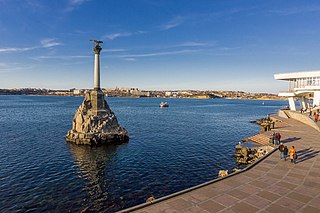
Sevastopol, sometimes written Sebastopol, is the largest city in Crimea and a major port on the Black Sea. Due to its strategic location and the navigability of the city's harbours, Sevastopol has been an important port and naval base throughout its history. Since the city's founding in 1783 it has been a major base for Russia's Black Sea Fleet. During the Cold War of the 20th century, it was a closed city. The total administrative area is 864 square kilometres (334 sq mi) and includes a significant amount of rural land. The urban population, largely concentrated around Sevastopol Bay, is 479,394, and the total population is 547,820.
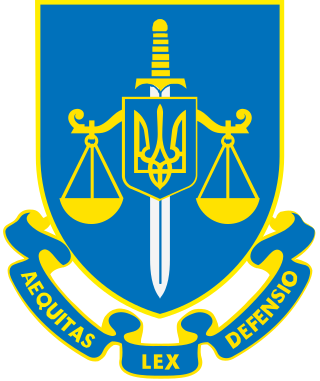
The prosecutor general of Ukraine heads the system of official prosecution in courts known as the Office of the Prosecutor General. The prosecutor general is appointed and dismissed by the president with consent of the Verkhovna Rada. The prosecutor serves a term of office of six years and may be forced to resign by a vote of no confidence in parliament. The current prosecutor general, since 27 July 2022, is Andriy Kostin.

Krasnoperekopsk or Yany Kapu is a town in Crimea. Following the 2014 annexation of Crimea, it was incorporated into Russia's Republic of Crimea. However, a majority of countries recognises the territory as part of Ukraine within the Autonomous Republic of Crimea. It is the administrative center of Krasnoperekopsk Raion. Administratively is not a part of the raion (district) and is incorporated separately as a town of regional significance. Population: 26,268 .

In 1954, the Presidium of the Supreme Soviet transferred the Crimean Oblast to the Ukrainian SSR from the Russian SFSR. The territory had been recognized within the Soviet Union as having "close ties" to the Ukrainian SSR, and the transfer itself commemorated the Union of Russia and Ukraine Tercentenary. Amidst the dissolution of the Soviet Union in 1991, the Ukrainian SSR seceded from the Soviet Union and Ukraine continued to exercise sovereignty over the territory as the Autonomous Republic of Crimea. For just over two decades after 1991, Russia did not dispute the Ukrainian administration in Crimea, but retracted this stance on 18 March 2014, when Crimea was annexed by Russia after coming under Russian military occupation. The Soviet-era transfer of Crimea has remained a topic of contention between the two countries in light of the Russo-Ukrainian War, as the Russian government has stated that the Ukrainians must recognize Russia's sovereignty over the territory as part of any negotiated settlement to end the Russian invasion of Ukraine, which began in 2022.
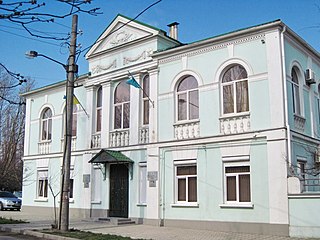
The Mejlis of the Crimean Tatar People is the single highest executive-representative body of the Crimean Tatars in period between sessions of the Qurultay of the Crimean Tatar People. The Mejlis is a member institution of the Platform of European Memory and Conscience.
The politics of Crimea today is that of the Republic of Crimea on one hand, and that of the federal city of Sevastopol on the other, within the context of the largely unrecognised annexation of Crimea by the Russian Federation in March 2014.
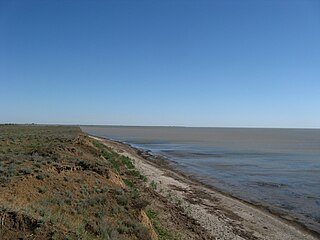
Krasnoperekopsk Raion is one of the 25 districts of the Autonomous Republic of Crimea, a territory recognized by a majority of countries as part of Ukraine and incorporated by Russia as the Republic of Crimea. It is situated in the northern part of the republic. The administrative center of the raion is the town of Krasnoperekopsk. The latter is not a part of the raion (district) and incorporated separately as a town of regional significance. Population : 24,738 .

The Crimean People's Republic or Crimean Democratic Republic was a self-declared state that existed from December 1917 to January 1918 in the Crimean Peninsula. The Republic was one of many short-lived states that declared independence following the 1917 Russian Revolution caused the collapse of the Russian Empire. The Crimean People's Republic was the First Turkic and Muslim Democratic Republic in the World.

The Crimean Regional Government refers to two successive short-lived regimes in the Crimean Peninsula during 1918 and 1919.

Pavlo Valentynovych Lebedyev is a Russian and former Ukrainian politician, financier and businessman who is currently a member of the Board of Russian Union of Industrialists and Entrepreneurs (RUIE). Head of Coordination Council of the Crimean branches of RUIE.

The Autonomous Republic of Crimea is an administrative division of Ukraine encompassing most of Crimea that was unilaterally annexed by Russia in 2014. The Autonomous Republic of Crimea occupies most of the peninsula, while the City of Sevastopol occupies the rest.

The Declaration of Independence of the Autonomous Republic of Crimea and Sevastopol was a joint resolution adopted on March 11, 2014 by the Supreme Council of Crimea and the Sevastopol City Council that proclaimed the Autonomous Republic of Crimea and the city of Sevastopol a sovereign state — the Republic of Crimea. The decision was taken after unmarked Russian soldiers invaded Ukraine and seized the Crimean parliament.

In February and March 2014, Russia invaded the Crimean Peninsula, part of Ukraine, and then annexed it. This took place in the relative power vacuum immediately following the Revolution of Dignity. It marked the beginning of the Russo-Ukrainian War.

The Republic of Crimea is a republic of Russia, comprising most of the Crimean Peninsula, but excluding Sevastopol. Its territory corresponds to the pre-2023 territory of the Autonomous Republic of Crimea, a de jure subdivision of Ukraine. Russia occupied and annexed the peninsula in 2014, although the annexation remains internationally unrecognized.

The Directorate of the Ministry for Internal Affairs in Sevastopol City or the Police of Sevastopol City has been the main law-enforcement agency in the government of Sevastopol since March 2014 after Russian forces seized Crimea and Sevastopol and unilaterally dissolved the local Ukrainian Militsiya of Sevastopol.

The Ministry of Interior in the Republic of Crimea is de facto the main police authority in Crimea in the Southern Federal District that was established by Russia after the 2014 Russian annexation of Crimea. Crimea is recognized as part of Ukraine by most of the international community.
The Crimean problem or the Crimean question is a dispute over the status of Crimea between Ukraine and Russia.
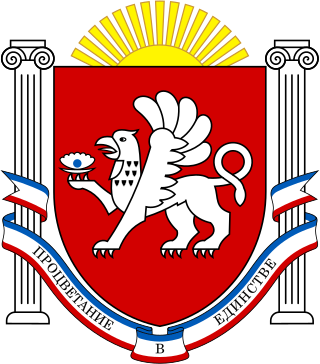
The Head of the Republic of Crimea is the highest official and the head of the executive power of the Republic of Crimea; an internationally disputed federal subject of the Russian Federation located on the Crimean Peninsula.
Sergey Vadimovich Abisov is the former minister of Ministry of Internal Affairs for the Republic of Crimea, and a police colonel.

The Prosecutor's office of the Autonomous Republic of Crimea - is a State Government Body. According to the Constitution and the Ukrainian Law, its functions at the Autonomous Republic of Crimea are prosecution, representation, supervision and control. According to the Acting Prosecutor General's decree No33 dated June 12, 2014, the Prosecutor's office of the Autonomous Republic of Crimea was temporarily relocated to Kyiv.


















